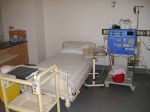A few weeks ago when I was dialysing at Lindfield in Sydney, I mentioned that they had planned to change their licence to provide a nocturnal (overnight) dialysis service, but found it to be too expensive to make the changes. The owners of that unit (Diaverum) recently built a new unit in North Melbourne, and this time they designed the unit for nocturnal dialysis from scratch.
I went along to the official commencement of nocturnal service last Tuesday.
Apart from the beds, I wasn’t sure what to expect. Do they use special, bendy needles? How do they check that the patient is OK and not leaking blood slowly all over the bed? Is it every night, or just a few? Do you get breakfast in bed? Is it better for me that daytime dialysis? Will my health fund pay for it?
For the answers to these questions and many more, read on…
Nocturnal dialysis is not new. I heard of it being used in at least one regional city (Geelong in Victoria) 15 years ago. I didn’t ask questions about it then; I just thought I wasn’t ready for that, so I promptly forgot about it. What I didn’t know was that it was being offered as a home dialysis option as an alternative to dialysing through the day. Some of the health outcomes achieved were quite spectacular, there were many devotees and it has grown as (home) dialysis option ever since.
Diaverum is the first to offer it as a private unit service in Australia. Patients arrive around 8:45pm, are hooked up by 9-9:30pm, using the the same dialysis needles used for daytime dialysis. They watch TV, movies, read, have a hot drink, etc, then off to sleep. At around 5:30am they are woken and disconnected from the machine. Typically they wash/shower and dress, have a light breakfast, and are gone by 6:30 – 7am. They do this three nights per week: Tuesday, Thursday and Sunday, with a long break Friday/Saturday and all day Sunday.
The machine runs fairly slowly (say 250 ml/min rather than 350 ml/min) so the dialysis is quite gentle. Because it runs for about eight hours each time, rather than the usual three hours, it is hugely effective in cleaning the blood. More about this later.
So far, no one has inadvertently bent their arm, pulled out needles or rolled the wrong way.

The Redsense Blood Leak Alarm
One of the innovations introduced for safety is a blood leak monitor, called a Redsense Alarm. It comes in two parts: the alarm unit and the blood sensor patch. The alarm unit is a lightweight disc clipped to the patient’s clothing. The sensor patch (self-adhesive back) is attached directly over the venous needle access point. The leads from the sensor are connected to the alarm, and the alarm sounds and flashes at the first drop of blood.
Two nursing staff are on duty through the night. They do initial observations, and check up regularly, but as long as the person is stable, they let them sleep until morning.
Because of the increased staffing required, nocturnal dialysis costs Diaverum more to provide than daytime dialysis, however, because they are looking to establish the service and to define accurate performance metrics, they are currently providing it for the same price as daytime dialysis. It would be worthwhile getting in early…
From the user’s viewpoint, there are several big advantages, and only one disadvantage I can think of:
- You get all of your days back. If you are working (all of the current patients work), there is no interruption to the work day. This is unheard of for daytime dialysis patients.
- You get your family time back (mostly). You can be there to help and support you partner and the kids. No disappearing at critical moments, like breakfast, parent-teacher interviews or driving the kids to sport or ballet.
- You get even more of your health back. The service has been in operation for six weeks so far, and as a result of the longer time on the machine and the resulting better clearance levels, two of the five people using it already have improved blood results, one coming off EPO and the other no longer requiring phosphate binders. More improvements are expected.
- The only disadvantage is a big one: if you are married/have a partner: three days a week you both sleep alone. Still, life is full of trade-offs; with daytime dialysis we are usually spending 15-plus hours apart.
Currently, the patients using the service are relatively young (30 – 55yrs). This makes sense. Younger BigD members are usually more stable on the machine, they are probably working and/or have young kids, so they value the day time when they can be there, and maybe they are a little more adventurous.
So, all in all nocturnal dialysis looks pretty good: the ideal service for the working/family person. Since it’s on offer here right now, I’m quite tempted to give it a go. I’ll let you know if I succumb.

 Professional dialysis recruitment
Professional dialysis recruitment

